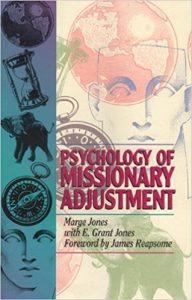For the first part of my review of Marge Jones’s The Psychology of Missionary Adjustment, click here. Part two “The Missionary Pedestal” can be found here.
The Psychology of Missionary Adjustment
Here’s some of what I have gleaned from Chapter Two of Marge Jones’ wonderful book, putting missionary adjustment into bite sized pieces that draw you into wanting more! Her book Psychology of Missionary Adjustment is difficult to put down. This very wise woman speaks from years of experience.
The Rupture
“Much is written about the shock experienced by a newborn during the birth process…
“Going to the field is an out-of-the-womb experience for most first-term missionaries.” They have left their support systems. They have left the known for the unknown. Nationals have a different value system so they really don’t know how to help the missionary adjust. Marge Jones shares that, unfortunately, missionaries seek their closest bonding with someone from their own culture, which further prevents a true adjustment to the new life.
Separation
Four stages are listed in dealing with missionary change, separation, or loss
- Denial – acting like they are in a vocation, rather than adapting to the new residence
- Anger – causing negative reactions like impatience or criticism
- Sadness – realizing the reality of the situation, often causing depression, despair, anger or guilt because of no meaningful relationships
- Resolution – accepting and adapting to the new culture in a positive way.
Just like a newborn baby needing a dependable caregiver, once separated from the safe womb, the missionary also needs a dependable caregiver after being separated from the familiar.

“During an earlier generation, new missionaries were rarely sent to work alone on any field.” There were “senior missionaries” and “junior missionaries”.”…It is still true that the new missionary needs an experienced missionary to guide them through the ups and downs of the new life.
Family
“Missionaries who have formed unhealthy relationships with parents tend to bring those faulty relationships to the field. This may cause them to make subtle demands for allegiance from coworkers or nationals.” More is shared in the book about the influence of family dynamics.
“The author found the following experiences to be some of the most traumatic for the first-term missionaries.”
- Security to Insecurity – learning to deal with situations like the local population does
- Safety to Danger – including medical emergencies
- Support System to Self-Reliance – the realization of having the sole responsibility for all decisions
- Comfort to Inconvenience – “The whole economic system in the United States functions for the comfort of the individual…what coping mechanism is available to the missionary when faced with a situation where nothing functions for the comfort of the individual or, in some cases, nothing functions at all?” “Frustration sets in because so much time and energy are spent in the ordinary tasks of living that the missionary has little left for the ministry. Questions such as Why am I here? are ever-present in the individual’s mind.”
- Known to Unknown – “Arriving on the mission field, an adult suddenly becomes like a child again…language differences,…social structures are a maze…value systems of the host country are completely different…the line between stealing and borrowing becomes very faint when hunger is a way of life…Goal-setting Americans suddenly find themselves in a people-oriented society. Relationships are far more important than getting the job done…”
- Love to Hostility – “How will the missionary react when rocks are thrown at the house or car or when spit upon? Love cannot be conveyed by words and the necessary actions become very difficult.” Myron Loss in his book Culture Shock states that “The most devastating result of cross-cultural conflict is not a sense of shock. Rather, it is a slowly advancing, nearly unnoticed psychological phenomenon which affects a person’s whole way of thinking about himself and about others.”
- total rejection of the new culture
- total rejection of the old culture
- grudging coexistence
- healthy integration of the new with the old
This chapter has more treasures than I can share here, but Ms. Jones also writes about:
- 3 unhealthy reactions to change, separation, and loss.
- 6 suggestions to help with separation
- 7 positive steps that can be taken by the new missionaries to help the adjustment process after the rupture.
The bottom line for the most successful adjustment is to “learn to look at every situation through the eyes of their host country neighbors. They will need to consciously replace old mind-sets (ways of thinking and reacting) with new ones, permitting innovative solutions to seemingly impossible circumstances.”
Missionary Mentor Coach
At the time of the writing of this book, Missionary Mentor Coaches did not exist. But, we do now! And that is a very good thing. We are trained to help with mindset shifts. With facing and embracing the what is and looking forward to what can be. We are forward thinking. We help you discover who God made you to be and how to enjoy the differences rather than fight them in others. We teach you how to become a team with those you work and do life with.
We are not connected to the sending agency so we can be totally objective; and the missionary can be totally honest without fear of being sent home. We understand that much of what the missionary is experiencing is merely a normal part of the adjustment process. This removes the self-condemnation which in turn removes a lot of pressure previously experienced! Joy returns!
All is confidential between the Mentor Coach and the Missionary on the field. We are that important stabilizing force, and we bring the encouragement the missionary needs to keep moving forward in the process. All the while, guiding you closer and closer toward learning how to go from surviving to thriving while serving overseas.
Help a Missionary Toward Success
- Purchase the book for them Psychology of Missionary Adjustment by Marge Jones
- Read the book yourself, to better understand the career missionary experience
- Gift a missionary: A minimum of 3 months of Mentor Coaching for a Missionary you know. Contact me & I’ll tell you how to do that!
- Don’t just send gifts. ASK them what they need. And what is the best way to get it to them.
- Pray for them. Support them financially without being asked
Thank you for all you do!
Stay tuned…More next week…
For Part Four "Language and Bonding Grinds," click here.



